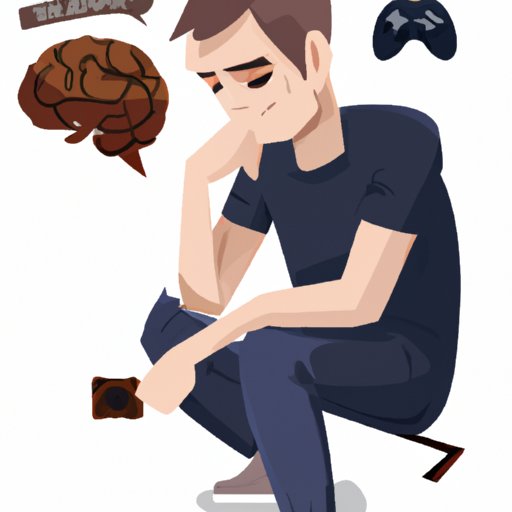Introduction
For decades, video games have been a topic of controversy among parents, educators, and mental health practitioners. Some argue that video games can lead to addiction and violent behavior, while others believe that they have several benefits for mental health. In this article, we will explore both sides of the debate and provide tips for incorporating gaming into mental health practices.
The Benefits of Video Games
Video games can have positive effects on mental health, including stress relief, improved hand-eye coordination, and increased creativity. A study published in the journal “Computers in Human Behavior” found that playing casual video games for 20 minutes a day can reduce stress and depression symptoms. Some games, such as puzzle games and strategy games, require problem-solving skills and promote creativity.
The Link Between Violence and Video Games
Many studies have been conducted to investigate the relationship between violent video games and mental health issues. Some studies have found a correlation between playing violent video games and aggression, while others have found no significant link. It is important to note that correlation does not necessarily mean causation. Other factors, such as a person’s upbringing and environment, can also influence aggressive behavior.
Moderation and Addiction Concerns
Like with any activity, it is essential to establish healthy gaming habits and avoid addiction. Signs of problematic gaming habits include neglecting other responsibilities, social isolation, and changes in mood. It is crucial to set boundaries and limit the amount of time spent playing games. Some strategies include setting a timer, taking breaks, and finding alternative activities to do.
The Social Aspects of Gaming
Multiplayer games can improve social skills, promote teamwork, and build positive relationships. A study published in the journal “Psychiatric Quarterly” found that playing MMO games can lead to increased social support and decreased loneliness. Cooperative games require players to work together towards a common goal, and this can promote teamwork and communication.
Video Games in Therapy
Therapists are starting to incorporate video games into their therapies as a new form of treatment. Video games have been used to treat depression, anxiety disorders, and PTSD. Some therapists use specialized video games to help patients with conditions such as ADHD, autism, and stroke recovery. A study published in “Cyberpsychology, Behavior, and Social Networking” found that video games can improve cognitive function in older adults.
Virtual Reality Games and Mental Health
Virtual reality (VR) games provide players with an immersive experience that can simulate real-world scenarios. VR has been used to treat phobias and anxiety disorders. Exposure therapy through VR can help individuals overcome fears and phobias in a controlled environment. A study published in “The British Journal of Psychiatry” found that VR exposure therapy is a promising treatment for social anxiety disorder.
Tips for Incorporating Video Games into Mental Health Practices
When incorporating video games into mental health practices, it is crucial to maintain balance and avoid overuse. Some tips for incorporating gaming into mental health practices include finding games that promote relaxation and practicing mindfulness techniques while playing. It is also essential to establish boundaries, set a time limit, and find alternative activities.
Conclusion
Overall, video games can have both positive and negative effects on mental health. It is essential to maintain balance and establish healthy gaming habits. Incorporating video games into therapy may provide additional benefits for individuals with certain conditions. It is crucial to individualize approaches to gaming and mental health practices and find what works best for each individual.
(Note: Is this article not meeting your expectations? Do you have knowledge or insights to share? Unlock new opportunities and expand your reach by joining our authors team. Click Registration to join us and share your expertise with our readers.)
